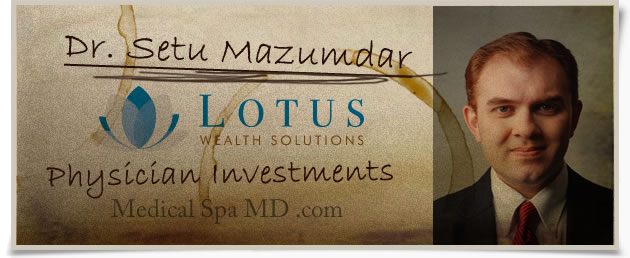2011 Tax Changes That Impact Physicians
/ Guest post by Setu Mazumdar MD
Guest post by Setu Mazumdar MD
The tax laws are changing in 2011. Here's how that will apply to you as a physician.
Recently I sent the following information to my clients regarding the 2011 tax law changes which are almost a done deal. Hope this helps you
You may have heard that a deal for 2011 tax laws is almost a done deal. I'd like to point out several things which will apply to you.
1. Federal income tax rates
Will remain the same as they are now for 2011 and 2012. However, we don't know what the cutoffs for the tax brackets are yet. It's unclear whether phaseouts for deductions on Schedule A of your income tax return will remain as is or will get worse next year. It looks like they will remain the same as now for the next 2 years. Obviously this is good news for high income taxpayers such as all of you.
2. Dividend and capital gains tax rates
Before this deal dividends in taxable accounts were going to be taxed at your highest rate, which was going to be 39.6% as of next month. However even the current dividend tax rate of 15% will stay on for 2 more year. This is also true for capital gains taxes, which were supposed to go up to 20% and instead will remain at 15% for 2 more years. If you have a taxable investment account, this will make it easier for me to rebalance portfolios since the cap gains rate will remain low.
3. Roth IRA conversions
I've already discussed and converted several of your traditional IRAs to Roth IRAs already this year. If you have not converted your traditional IRA to a Roth yet but are considering it, you may be OK doing it next year in order to defer paying taxes on the conversion. However, realize that by converting this year there is an option to spread out the income over 2011 and 2012 and that option is good ONLY for converting in 2010.
The other issue is that for those of you whom we've converted in 2010 already, it is probably more advantageous for you to spread out the income over 2011 and 2012 since tax rates will remain the same. Please discuss this option with your CPA when tax time comes. In other words instead of reporting the income on the conversion for 2010 only (this would be more advantageous if tax rates are going up next year) you may be better off reporting it in 2011 and 2012 in order to defer taxes to those years.
That brings up another issue—estimated tax payments. If your CPA plans on reporting this all in 2010, then adjust your 2010 Q4 estimated tax payment. However, if the plan is to split the income from the conversion in 2011 and 2012, then there may not be a need to adjust your Q4 estimated tax. Instead, you will have to adjust estimated taxes for 2011 and 2012.
And finally if you have nondeductible IRA contributions, remember that portion is not taxed on the conversion.
4. Estate tax
It looks like the estate tax exemption will be $5 million for 2011 and 2012. This changes things like whether to set up life insurance trusts. However, realize that this is once again a temporary rule and eventually this will change again in 2 years. So it may still be better to proactively address these issues rather than to address them later. But at least this might buy some more time.
5. Medicare investment tax is coming
For taxable investment accounts starting in 2013 there will be an additional Medicare investment tax on investments sold for a gain in addition to capital gains tax. This tax will be 3.8% on "high income" earners and will apply to both capital gains and dividends. This was part of the health care law passed earlier this year. Of course the details on this still have to be worked out.
Hope that helps put some of this in perspective. If you have any questions about this, please ask them as a comment and I'll do my best to answer them.
Setu Muzamdar MD blogs on physician investing and wealth management at Freelance MD
Submit a guest post and be heard.







